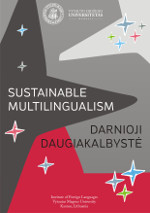NATURALNESS OF CHANGEABILITY AND VARIABILITY IN CONTACT SITUATIONS – PROPERTIES OF LANGUAGES OR LINGUISTIC FACULTIES OF COMMUNICATING AGENTS
NATURALNESS OF CHANGEABILITY AND VARIABILITY IN CONTACT SITUATIONS – PROPERTIES OF LANGUAGES OR LINGUISTIC FACULTIES OF COMMUNICATING AGENTS
Author(s): Elżbieta Magdalena WąsikSubject(s): Theoretical Linguistics, Applied Linguistics, Comparative Linguistics, Sociolinguistics
Published by: Vytauto Didžiojo Universitetas
Keywords: communicating individual;differentiation of languages;idiolect;language change;markedness;naturalness
Summary/Abstract: The paper tackles two investigative approaches to the study of mutual influences among languages in which researchers focus either on languages themselves or on communicating individuals. Considering the question of whether and to what extent the contact-conditioned language development results from structural properties of respective languages, or is rather triggered by psychic properties of their speakers, the study exposes, on the basis of selected literature on the subject, a causative role of humans in language contacts. At the same time, it argues that the search for unborrowable language features and structures entails defining naturalness, unmarkedness, and markedness in terms of human abilities. More critically, this paper substantiates the statement that uncovering the rules, which govern the contact-induced language change in terms of communicative properties of humans, implies, for example, the necessity of dealing with identity and group affiliations of multilingual subjects demonstrable, apart from language transfer and lexical and grammatical interference, mostly in codeswitching. Thus, the author argues that the sources of linguistic changeability and variability in contact situations must be read, in the first instance, into the psychic conditionings of socially and culturally determined language speakers. All in all, she tries to prove that linguistic borrowings cannot be examined in accordance with universal applicability or absoluteness but with reference to principles of human perception, memorizing, the ability of association, etc., as well as the economy of effort in communication in conjunction with individual and socio-cultural needs of humans, their knowledge and attitudes.
Journal: Darnioji daugiakalbystė
- Issue Year: 2016
- Issue No: 8
- Page Range: 122-141
- Page Count: 20
- Language: English

